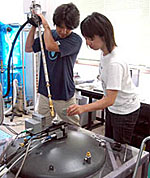Program in Physics and Functional Materials Science
The 20th century began with a revolution in physics, and its spillover effects can still be felt in practically every aspect of modern life. Television, the internet and noninvasive medical procedures all are unthinkable without it. There is no doubt that physics will maintain its position at the very center of the natural sciences in the 21st century as well. Nanotechnology, for instance, holds the promise of opening up a treasure trove of useful functional materials. In the physics department, students investigate natural phenomena across many levels and endeavor to explain the manifold properties of materials from first principles, while in the functional materials department they try to apply their understanding of the characteristic behavior of materials to develop materials with novel properties and use these as the starting point in the design and production of new devices. Education and research span the range from foundations to the cutting edge and aim to foster individuals with a wide range of vision, who are able to make contributions to society here and at the international level.
Course in Physics

Students measuring the properties of new material they have created themselves.
Physics is the basis of all natural sciences and the student of this major firstly strives to understand the fundamental principles of physics and the physicist’s “way of thinking” about nature. The instruction in the physics department aims to educate highly skilled researchers and engineers with the ability and necessary mental flexibility to actively engage with problems in science and technology. This means in concrete terms that we are conducting research, which tries to elucidate the reaction mechanisms and the interaction of the constitutive elementary particles in every hierarchical stages ranging from the microscopic scale to the macroscopic scale encompassing the entire universe. In these studies we are using the newest quantum scientific methods (neutron scattering, NMR, μSR, various techniques of numerical and analytic calculation) to investigate the structure and dynamics of condensed matter. In addition we create new types of matter and measure their properties under multiple extreme conditions. The student starts by acquiring a solid understanding of quantum science and the basic principles underlying the structure of matter. They proceed by becoming acquainted with the most advanced methods of numerical simulation, observation and experiment. We hope to foster individuals with a capacity to gather information, solve problems and work successfully in an international setting.
Course in Functional Materials Science

A Laser Experiment.
The student of functional materials science tries, through an understanding of the basic properties of matter, to design materials at the atomic and molecular level, and by controlling their characteristics, to synthesize and manufacture materials with new functionality, which lead to the invention of devices that make a contribution to human society. The course comprises four areas of research. (1) The area of quantum well light emitting elements, low dimensional quantum optics, magnetic semiconductors, amorphous magnetism, and related subjects. (2) The area of quantum device engineering, which includes the investigation of the properties and manufacture of high frequency magnetic materials, thin films for high density data storage and materials for the head of hard disk drives, semi-conducting materials for solar cells, dielectric materials, and substrates for hydrogen storage. (3) The area of molecular design and device engineering dealing with porphyrin supramolecular materials, polysilane light emitting materials, and sugar chain carbosilane dendrimers with the capability to recognize molecules. (4) The fields of evolutionary molecular engineering, which applies in vitro evolution to proteins, DNA and other biological macromolecules and biopolymer engineering, where the genome is analyzed using the methods of bioinformatics and one tries to develop molecules with specific properties based on the insights thus gained.